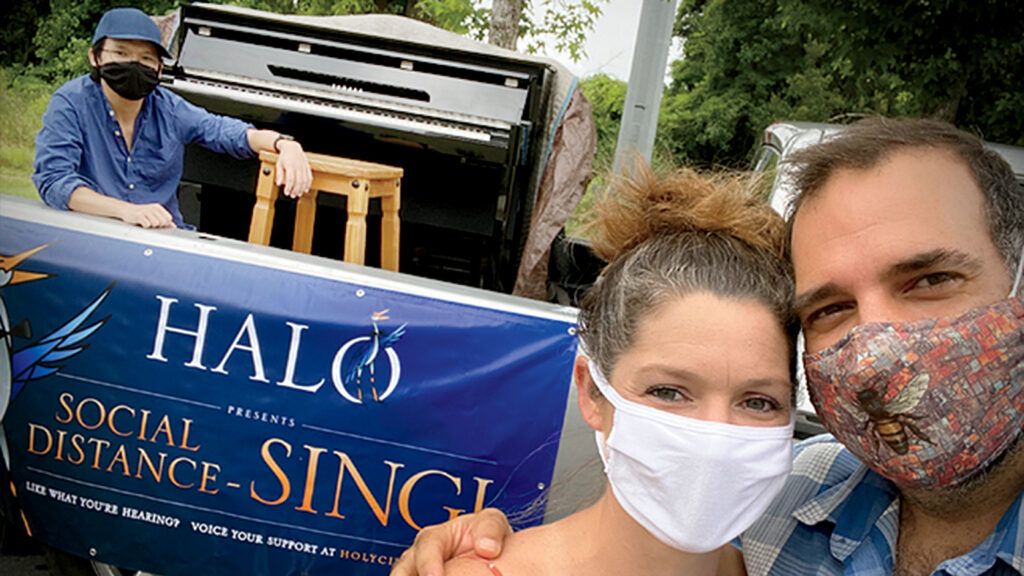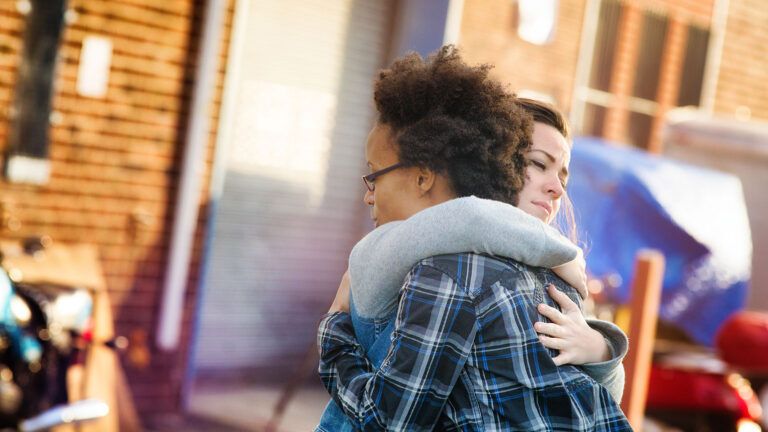Almost a year ago, in March 2020, the Covid-19 pandemic shut down most of the country. People sheltered at home. Businesses closed. Churches suspended services.
Everywhere, music fell silent. Artists feared for their livelihoods. People of faith wondered when they’d sing together again.
The silence didn’t last long. Turns out, it takes a lot more than a pandemic to suppress our human need to sing, play and be transported by music.
Singers, songwriters, choral groups and instrumental players devised new creative ways to bring God’s glorious gift of music to their communities.
Guideposts went in search of these resilient musicians. Across the United States, we found people of faith and goodwill meeting the challenge of the pandemic with a song in their heart and music at their fingertips. We’d like to introduce you to a few of these inspiring artists.
Dimitri Pittas and Leah Edwards, Charleston, South Carolina
Married opera singers Dimitri Pittas and Leah Edwards were stuck at home. Singing engagements were canceled. “It could have been so easy to step away from it all and say, ‘What’s the point?’” Dimitri says.
Yet something compelled the couple to keep practicing, singing arias and scenes from operas. The lockdown was depressing, but they sang anyway.
One day, a neighbor said she’d enjoyed overhearing them practice. That gave Dimitri and Leah an idea.
“We thought it could be fun to stage a mini concert outside,” Leah says. A pianist friend played in the driveway while Dimitri and Leah sang from the porch. Neighbors listened from their yards.
“It was just supposed to be a one-off,” Leah says. “Then neighbors asked if we could do it again next week.”
Soon the couple was singing weekly all over Charleston. They started a nonprofit to offer live outdoor opera and musical theater to even more people: Holy City Arts & Lyric Opera (HALO). They called their concert series “Social Distance-SING!”
Rave reviews poured in. One woman said the concert she’d attended didn’t just change her day—it changed her whole month.
“The most surprising part has been the catharsis,” Leah says. “Not just for us as performers but for them as listeners. Everyone is having big feelings right now without having a way to express them. Music lets us do that.”
“We knew people were missing an emotional connection,” Dimitri says. “We were able to give them that with music.” Find out more and request a local performance at holycityarts.org.
Association of Lutheran Church Musicians, Valparaiso, Indiana
For church musicians, the pandemic struck at the heart of their calling. Group singing was identified as a major risk for spreading the coronavirus, shutting down in-person church services and silencing organs and choirs.
The 35-year-old Association of Lutheran Church Musicians refused to stay quiet. Inspired by the Episcopal Church, which gathered more than 600 participants around the world for an online Easter Day rendition of the hymn “The Strife Is O’er,” the ALCM invited all 1,700 of its members to contribute to a similar production for Pentecost.
The goal was 400 participants. In the end, 960 singers and 364 instrumentalists signed up. With the help of the production company that worked on the Episcopal hymn, Inside Music Nashville, the artistic director and eight singers from the National Lutheran Choir recorded online guide tracks of the hymn “O Day Full of Grace.” Using those recordings as a guide, musicians around the country made and submitted their individual recordings. The 1,324 submitted recordings were combined into a single recording that sounded like a massive, nationwide choir.
The hymn was streamed online and distributed to every Lutheran church that wanted to include it as part of the Pentecost service. Even the smallest, least tech-savvy church “had a way to keep music in their worship,” says Jim Rindelaub, ALCM’s executive director.
“Imagine if all the worship services had no music whatsoever,” he says. “Music brings a healing element to worship. It provides joy and allows us to process feelings of anger, fear and doubt so we can then move to a space of hope and faith.” For resources on how to create your own virtual choir, visit alcm.org.
Olga Morkova and Dan Kurfirst, New York, New York
New York City bore the brunt of the pandemic’s first wave. Streets emptied. Sirens wailed. Hospitals overflowed. Tourists vanished. Broadway went dark.
Olga Morkova, a performing arts producer, and Dan Kurfirst, composer, drummer and percussionist, were determined not to let the city’s lights dim completely.
They gathered friends and colleagues who played saxophone, tuba, drums and other instruments for some impromptu outdoor jazz concerts.
“We focused on positive music,” says Dan. “We understood that everyone just wanted a way to feel good.”
To stay safe, musicians played from their cars, hanging out the window or sitting in their trunks. Concerts From Cars was born.
“New York is a city of music,” Olga says. “There are usually hundreds of concerts happening on the same night. In those early days, we were some of the only musicians playing outdoors together in the city.”
People sent requests. One woman asked the musicians to come play for her sister, who had been confined at home with two young children in Queens. “When we played, she just came outside and cried with relief,” Olga says.
People watched from windows or stoops. Some even followed the musicians from location to location in their own cars. Other musicians came outside and joined them.
“Being a professional musician in New York, you can become a little jaded,” says Dan. “This experience helped us remember why we love music in the first place.” Keep up with Concerts From Cars at centerpointarts.com.
Eloy Garza, Roma, Texas
When the pandemic shut schools, student musicians were cut off from their bands, orchestras and choirs.
Eloy Garza is musical director at Roma High School, which has one of the country’s most unusual student bands: an ensemble called Mariachi Nuevo Santander.
Mariachi is a traditional Mexican genre of music comprised of guitars, violins and trumpets. It is especially popular along the U.S.- Mexico border. For generations, mariachi music has played from car radios and accompanied family and community celebrations in Roma and throughout the border region.
Eloy’s students are some of the top high school mariachi performers in the country. “Our competition season was canceled for the whole year,” Eloy says. Figuring out how to keep playing “kept a lot of our students moving forward.”
Eloy encouraged each student to record themselves playing at home. He combined the performances online to create a virtual mariachi band. “I’d never done anything like this before,” he says. “I figured, let’s just try it and see what happens.”
The finished product became more than just another school assignment. “We wanted to share it, to encourage the whole district, the teachers and students, that we can do this together,” Eloy says.
He posted the video on Facebook. Within two weeks, it had more than one million views. People from around the world shared the video and posted comments encouraging the band.
Eloy says he was “blown away” by the worldwide response. Even better, he says, was how the video inspired his own students. “It helped my students not feel discouraged,” he says. “Whatever our circumstances, we know we can still make music together.” Watch the band’s videos at facebook.com/romaisdmariachiprogram.
Dr. Suzanne Hanser, a music therapist and president of the International Association for Music and Medicine, says it’s no accident that people reached for the comfort and inspiration of music during the pandemic.
Music activates neurological processes that flood the brain with what Suzanne calls “feel-good chemicals,” neurotransmitters associated with feelings of joy, peace and well-being. Music can steady a person’s heart rate, slow breathing and lower blood pressure.
“If you have memories with that music—whether from religious services, your wedding, your prom— music can immediately put you back in that time. You can feel all the sensations you felt then,” Suzanne says.
“Music can help us focus our attention on emotions, instead of burying them,” she says. “Then we can process and release those feelings in a way that is constructive”—something all of the musicians we talked to know.
Opera singers Dimitri and Leah say they will perform concerts in Charleston as long as they keep getting requests, which haven’t slowed down.
Olga and Dan are brainstorming ways to keep Concerts From Cars going in New York year-round.
Lutheran musician Jim Rindelaub says the ALCM is putting together another massive virtual choral arrangement.
Eloy Garza and his students have released more videos of their virtual mariachi band.
Music brings us together. As the beloved spiritual says: Lift every voice and sing!
For more inspiring stories, subscribe to Guideposts magazine.





